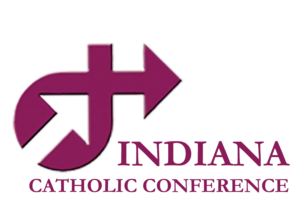By Victoria Arthur
Statehouse Correspondent for Indiana’s Catholic Newspapers
 When state lawmakers return to downtown Indianapolis Jan. 9 to begin the 2023 General Assembly, the Indiana Catholic Conference will stand ready to speak for the most vulnerable and shed light on the key issues of the day.
When state lawmakers return to downtown Indianapolis Jan. 9 to begin the 2023 General Assembly, the Indiana Catholic Conference will stand ready to speak for the most vulnerable and shed light on the key issues of the day.
Fiscal concerns will top the agenda for this long 2023 session of the General Assembly, held every two years and culminating in passage of the state budget – likely in early May.
As in past legislative sessions, the ICC hopes to see a long-overdue update of the Temporary Assistance for Needy Families program. TANF is a federal government program that provides grants to the states for distribution to families in dire economic circumstances. Because of outdated state guidelines, the $288 maximum monthly cash payment for a family of three in deep poverty has not been adjusted for inflation since 1988.
Much to the dismay of the ICC and other advocates for the poor, proposed legislation to update TANF has been passed over in the General Assembly.
“Even though TANF money flows to the states from the federal government and is readily available, Indiana has not offered an increase in monthly payments for the neediest of the needy in more than three decades,” Espada said. “With inflation continuing to grip our economy, we need these changes more urgently than ever.”
Other key priorities for the ICC that remain constant include respecting the dignity of all life from conception to natural death, supporting religious freedom and protecting the ability of families to make the best decisions for their children’s education. As it has for more than five decades, the ICC will draw upon 2,000 years of Catholic social teaching to influence the debate on important issues and legislation.
“The ICC is the public policy voice for the Catholic Church in the state of Indiana,” said Angela Espada, the sixth and current executive director of the ICC. “Simply put, we advocate either for or against proposed legislation in line with the long and rich history of Catholic social teaching. As always, promoting the common good and protecting the most vulnerable members of society form the basis for the Church’s engagement in the public arena.”
A pivotal opportunity arose June 24, 2022, when the U.S. Supreme Court overturned the 1973 Roe v. Wade ruling that had declared a constitutional right to abortion, returning regulation of the procedure to the states.
The high court’s ruling in Dobbs v. Jackson Women’s Health Organization served as the catalyst for a special session of the Indiana General Assembly, from late July to early August, which culminated in the passage of groundbreaking legislation significantly limiting abortion. Senate Enrolled Act 1 banned surgical and chemical abortions with some exceptions, including pregnancies resulting from rape or incest (within 10 weeks of fertilization), cases of lethal fetal anomalies or to save the life of the mother (up to 20 weeks post-fertilization).
The measure also terminated the licensure of all abortion centers, and required abortions to be performed in hospitals or surgical centers owned by hospitals. Historically, nearly all abortions in Indiana have taken place in abortion centers, such as those operated by Planned Parenthood.
Senate Enrolled Act 1 took effect Sept. 15, and was almost immediately challenged in court by Planned Parenthood and the American Civil Liberties Union. The legislation continues to be tied up in the judicial process.
In the 2023 legislative session, the ICC will continue to serve as a voice for the unborn while also advocating for other key issues across the pro-life spectrum.
“We will redouble our efforts to fight for the dignity of life at all stages,” Espada said. “This includes opposing assisted suicide and striving for an end to the death penalty in Indiana. We also will continue to encourage lawmakers to fund programs that support mothers, babies and families, especially as historic inflation disproportionately affects the most vulnerable among us.”
In all its efforts, the ICC calls upon the Catholic faithful to stay informed and engaged on key issues and legislation and offers numerous resources to do so. The ICC website, www.indianacc.org, provides access to I-CAN, the Indiana Catholic Action Network. Those who sign up for I-CAN receive action alerts on important legislation and ways to contact their elected representatives.
The ICC now has parish liaisons throughout Indiana to assist with communication and advocacy efforts, but can always use more, Espada said. Information about the liaison role may be found on the website. In addition, Espada and Mingus welcome the opportunity to visit parishes to discuss their work and Catholic social teaching, which guides everything the ICC does.
For more information and ways to get involved with the ICC and its mission, visit www.indianacc.org.
